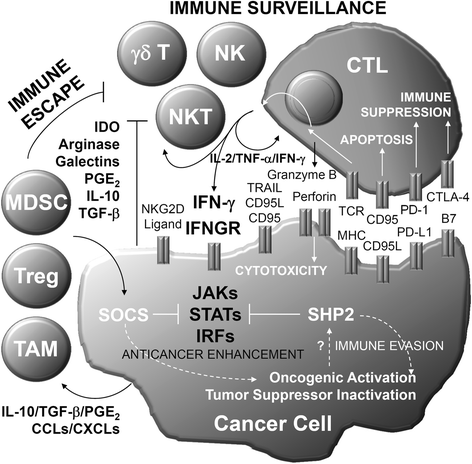Escape from IFN-γ-dependent immunosurveillance in tumorigenesis
- PMID: 28143527
- PMCID: PMC5286687
- DOI: 10.1186/s12929-017-0317-0
Escape from IFN-γ-dependent immunosurveillance in tumorigenesis
Abstract
Immune interferon (IFN), also known as IFN-γ, promotes not only immunomodulation but also antimicrobial and anticancer activity. After IFN-γ binds to the complex of IFN-γ receptor (IFNGR) 1-IFNGR2 and subsequently activates its downstream signaling pathways, IFN-γ immediately causes transcriptional stimulation of a variety of genes that are principally involved in its biological activities. Regarding IFN-γ-dependent immunosurveillance, IFN-γ can directly suppress tumorigenesis and infection and/or can modulate the immunological status in both cancer cells and infected cells. Regarding the anticancer effects of IFN-γ, cancer cells develop strategies to escape from IFN-γ-dependent cancer immunosurveillance. Immune evasion, including the recruitment of immunosuppressive cells, secretion of immunosuppressive factors, and suppression of cytotoxic T lymphocyte responses, is speculated to be elicited by the oncogenic microenvironment. All of these events effectively downregulate IFN-γ-expressing cells and IFN-γ production. In addition to these extrinsic pathways, cancer cells may develop cellular tolerance that manifests as hyporesponsiveness to IFN-γ stimulation. This review discusses the potential escape mechanisms from IFN-γ-dependent immunosurveillance in tumorigenesis.
Keywords: Cancer; Escape; Hyporesponsiveness; IFN-γ; Immunosurveillance.
Figures

References
-
- Abril E, Real LM, Serrano A, Jimenez P, Garcia A, Canton J, Trigo I, Garrido F, Ruiz-Cabello F. Unresponsiveness to interferon associated with STAT1 protein deficiency in a gastric adenocarcinoma cell line. Cancer Immunol Immunother. 1998;47(2):113–120. doi: 10.1007/s002620050511. - DOI - PMC - PubMed
Publication types
MeSH terms
Substances
LinkOut - more resources
Full Text Sources
Other Literature Sources
Research Materials

